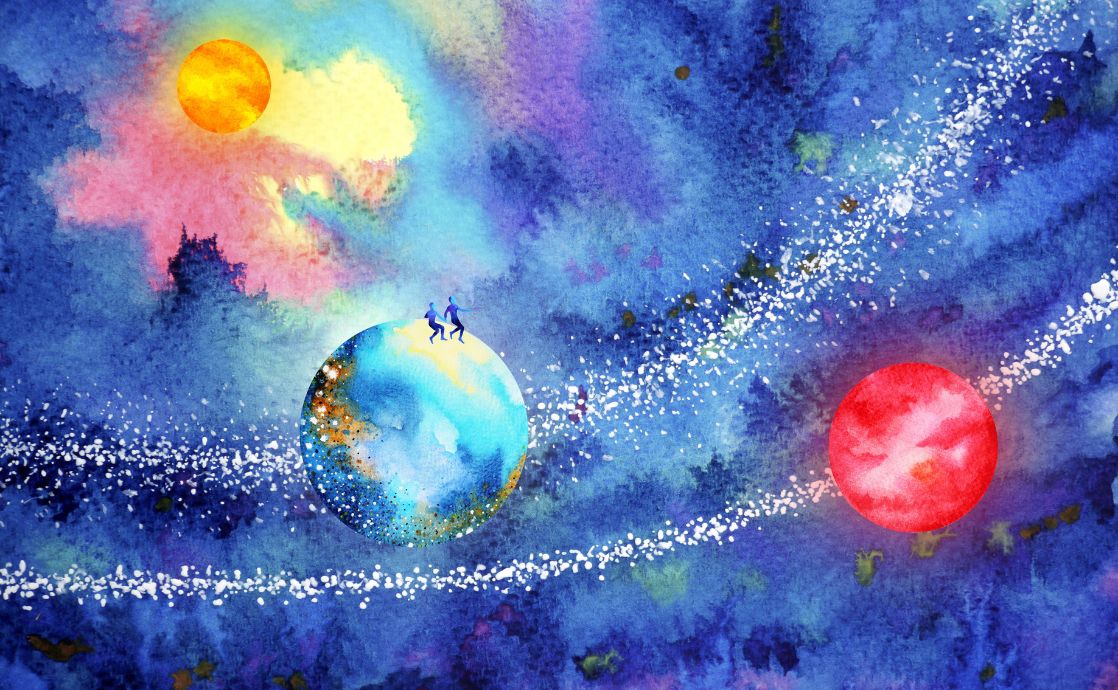The views expressed in our content reflect individual perspectives and do not represent the authoritative views of the Baha'i Faith.
If you keep up with the news today, you undoubtedly know of the extraordinary perils of our time, from wars and rumors of wars to the deepening divisions and decline of civility at all levels of society.
We face the severe impacts of climate change and environmental degradation that threaten our food and water supplies, the erosion of trust in once-cherished institutions, and the alarming tolerance for “alternative facts” and false narratives, to name a few. My stomach hurts when I contemplate the myriad and sundry threats we all face in this fractious, shamefully inequitable, and disordered world.
It’s only natural for us to compartmentalize or hold onto blissful denial just to get through the day, but if you’re still reading, I suspect you would agree that we live in a scary time where things often appear on the verge of spinning out of control.
Somehow, we need to find solid ground, especially when swirling tempests rage around and within us.
How do we manage to feel safe in these challenging times, and what do the Baha’i teachings have to say about our safety and security? An internet search will generate a multitude of strategies to address physical safety and security, but I’d like us to think about the ultimate answer to these crucial questions.
By my reading of the Baha’i teachings, we must find our long-lost home in the spiritual world, as this prayer from Baha’u’llah recounts: “Thou seest, O my Lord, this stranger hastening to his most exalted home beneath the canopy of Thy majesty and within the precincts of Thy mercy …”
RELATED: Einstein’s Toaster: How to Better Understand and Use the Baha’i Prayers
If this sounds a bit unusual for a safety strategy, hang in there and read on. I think of it this way: Imagine you are lost somewhere in a foreign land where dangers lurk on every side. Everywhere you turn, there are new threats to your safety. You just want to go home!
It turns out that your home is closer than you imagine.
Before you laugh and say, “Where do I get my ruby slippers?”, you might be interested to know that a solid majority of the global population holds the belief that there is a life force within us that survives our physical deaths — that our consciousness and identity live on after our bodies turn to dust. Personally, I have had experiences that back up this belief. I’ll relate just one.
My wife Leslie’s mother, Ethel, was on her deathbed at age 100, lying prostrate and nearly comatose while Leslie held her hand. I silently sat in the corner of the room with my laptop turned away where no one could see. To pass the time, I was writing about fictional characters: a British doctor in Persia in the 1850s and his love interest, Layli, a Persian maidservant.
The moment I typed the words, “Henry and Layli are worlds apart,” Ethel suddenly and surprisingly rose up from her bed and said, “I don’t understand!”
Leslie said, “What don’t you understand, Mom?”
Ethel replied immediately, “Why they’re so far apart!”
“Who’s so far apart, Mom?” Leslie asked.
But Leslie’s mother didn’t answer; she lay back down on the bed. She was transitioning gradually, and evidently, her soul was aware of what I was thinking and typing. She passed away peacefully the next morning.
If you believe in an afterlife, as Baha’is do, have you ever wondered what your soul or spirit is doing in this material world as you work, play, worry, fret, and interact with others? How do we come to know that our soul is really there? We can’t see it or touch it. Does it need nourishment like our bodies need food, water, and air? Does it have powers we can tap?
The Baha’i teachings say that we absolutely need to feed our souls on a daily basis, and rely on the spiritual resources within our reach. In fact, the Baha’i teachings suggest that the need is urgent, that we can’t afford to wait, that this is the time for us to turn our attention to the spiritual part of our being.
To delve deeper into those questions, I want to introduce you to Baha’u’llah (1817-1892), the prophet and founder of the Baha’i Faith, a Persian nobleman who sacrificed his comfort and safety for the promotion of humanity’s spiritual life. When Baha’u’llah revealed the Baha’i teachings, he established a global blueprint to turn this Earth into a healthy, secure, safe, and peaceful home for humanity. Among his 100 volumes of writings, he wrote:
Know thou that the soul of man is exalted above, and is independent of all infirmities of body or mind …. Consider the light of the lamp. Though an external object may interfere with its radiance, the light itself continueth to shine with undiminished power. In like manner, every malady afflicting the body of man is an impediment that preventeth the soul from manifesting its inherent might and power. When it leaveth the body, however, it will evince such ascendancy, and reveal such influence as no force on earth can equal. Every pure, every refined and sanctified soul will be endowed with tremendous power, and shall rejoice with exceeding gladness.
Baha’u’llah’s words provide a guide, not just to the Baha’i community, but to the world at large:
To whatever place We may be banished, however great the tribulation We may suffer, they who are the people of God must, with fixed resolve and perfect confidence, keep their eyes directed towards the Day Spring of Glory, and be busied in whatever may be conducive to the betterment of the world and the education of its peoples.
Baha’u’llah promised us that “The well-being of mankind, its peace and security, are unattainable unless and until its unity is firmly established.”
So, how do we find our spiritual home in the midst of all the turmoil and perils of the day?
Baha’u’llah’s revelation first came to him in a dungeon in Tehran, Persia named the Black Pit, three flights underground, a prison so foul that visitors would faint from the stench. He survived four months in the winter of 1852-53 in mud and filth, weighed down by heavy chains so notorious that they had names assigned to them.
Yet, spiritually speaking, he was home. Amazingly, he taught his fellow prisoners to sing in praise of their Creator!
I hope to remember this in times of peril and when I’m finally called to cross over to the next world.
You probably already know that Baha’u’llah was not a prisoner for having committed any crime, but for fearlessly promoting, in Muslim lands, new spiritual teachings such as the equality of women and men, the elimination of prejudices of all kinds, the eradication of superstition and fanaticism, the embrace of science and reason, and the imperative of regarding the peoples of the world as one human family.
RELATED: Surviving and Thriving, Despite the Chaotic Forces of Modern Life
From that early imprisonment until his passing in 1892 in the Holy Land, Baha’u’llah was never safe from the threat of physical harm, enduring torture and indignities for most of his life, all to plant the seeds of a new era in human history — one of unity, justice, and peace.
His call to humanity included these words:
The days of your life flee away as a breath of wind, and all your pomp and glory shall be folded up as were the pomp and glory of those gone before you …. Happy the days that have been consecrated to the remembrance of God.
We can read Baha’u’llah’s spiritual admonitions for clues about how we should invest our time, energy, and resources in these days of radical change and upheaval.
The solid ground we all seek can be found in the knowledge that we are fundamentally spiritual beings in the care of an almighty Creator. Because we’re spiritual beings, the best nourishment for the soul is the word of God revealed by His messengers through the millennia, the latest brought by the voice and pen of Baha’u’llah. Those teachings provide the elixir that can calm our fears as we work diligently on today’s immense challenges and thus become empowered rather than helpless. We’ll each feel better if we are a part of the solution, not the problem.
We can’t guarantee that we’ll always be safe materially in this world, but spiritually, home is so sweetly just a step away.
You May Also Like
Comments

















I'm also jazzed that you're writing about fictional characters. I think that's where I do so much of my learning as I work the ideas and concepts I "grew up" with in the Faith into my fictional worlds. My youngest daughter, Amanda, has been badgering me to actually sit down and write a novel I outlined ...about Tahireh, told from the viewpoint of a fictional maidservant in her home. Reading your article made me wonder if I shouldn't acquiesce to her request. Hugs!